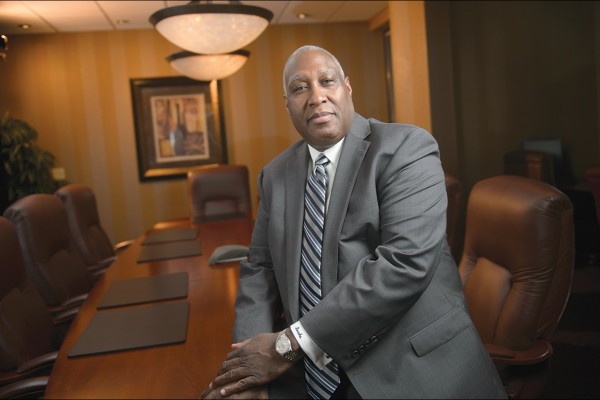Switch hitters: Attorneys differ on whether working both sides leaves some off base
By: Amy Karon, [email protected]//November 19, 2012//
Switch hitters: Attorneys differ on whether working both sides leaves some off base
By: Amy Karon, [email protected]//November 19, 2012//

Milwaukee litigator Emile Banks is comfortable on either side of the courtroom.
Though many of his clients are insurance companies he also occasionally represents insurance claim plaintiffs.
It’s just part of business as a trial lawyer, he said.
“They call us switch-hitters,” Banks said. “Sometimes we bat on the right side, and sometimes we bat on the left. There are occasions when some of my clients will allow me to bring lawsuits against them, and the reason is they know they would rather have a lawyer who is fair, with good judgment.”

Not all clients are comfortable with Banks working both sides of the room, however.
He once filed suit against an insurance company he’d previously defended. Though the company waived the conflict, allowing Banks to represent the plaintiff, the claims adjuster became visibly upset when Banks refused to undersell his client.
“I told the mediator that I have a duty to this client to zealously represent her,” Banks said. “I’m not going to compromise her right to representation to save my relationship with that insurance carrier, especially when they gave me a written waiver and told me it was okay to proceed.”
“Unfortunately, that adjuster hasn’t sent me another case since that time,” Banks added. “That was more than five years ago.”
While rules of professional conduct give attorneys some wiggle room in handling potential positional conflicts of interest, striking a balance between opposing clients can be difficult.
“When you are committed to representing the interests of the injured, it is very difficult to switch sides and represent insurance carriers,” said Christine Bremer Muggli, a personal injury lawyer with Bremer & Trollop SC, Wausau. “Our goals are to make something happen. The defense attorneys’ goals are to make it stop happening. It’s a totally different mindset.”
Muggli said she feels so strongly about the issue that she’s refused to represent anyone but plaintiffs in about 30 years. That doesn’t mean it can’t be done, however, she said.
“I know some excellent lawyers who do both, and that is their choice,” Muggli said. “That does not diminish their commitment to their clients. They are really good trial lawyers, and they swing both ways.”
Banks said many insurance companies he defends will not waive conflicts of interest for him or other lawyers. But the vice president of one major liability insurance carrier in Wisconsin, who Banks declined to name, told him he would rather have Banks sue his company than a lawyer who “does not have his best interests at heart.”
Banks, of Emile Banks & Associates LLC, acknowledged that representing a plaintiff in a suit against a former client does raise concerns about hard feelings and losing repeat business.

“But once they give me the waiver, I can’t have any concern about that,” he said. “I make sure that under all circumstances, I treat my client with respect and candor.”
Switching sides offers litigators the chance to hone their courtroom skills, said David Schoenberger, of Bakke Norman SC, New Richmond. Schoenberger regularly represents employers and employees in employment discrimination cases, though not from the same company.
“Handling both ends of the spectrum is beneficial,” he said. “For employees, I’m going to know how a plaintiff’s attorney is going to approach that case, and most importantly, how a judge is going to approach that case. And for employers, we can sniff out pretty easily and early whether the employee’s claim has merit.”
Not all lawyers are comfortable with the dual roles, though. Patricia Epstein, a civil defender at Bell, Moore & Richter SC, Madison, said she has done some plaintiff’s work over the years, but the work’s contingency fees discomfit her.
When she represented a physician plaintiff against the woman’s former employer, for example, Epstein said she ended up taking only the firm’s costs out of the settlement.
“I got so attached to the client and her plight,” Epstein said. “When the case settled, I waived the contingency fee entirely. I had put way more time into the case than a third of the fee even was. But I felt like I couldn’t take her money.”
[polldaddy poll=”6672133″]
From a business perspective, said professor Andrea Schneider of Marquette University Law School, taking clients from both sides of a particular practice area often does not make sense.
“On the one hand, you can look at the legal market and say that attorneys and clients are not loyal to one another, that the days of tight, long-term relationships are gone,” Schneider said. “On the other, I think clients still have a legitimate expectation of loyalty. ‘How can you be my knight in shining armor today and my adversary tomorrow?’”
She advocates caution, discretion and planning ahead when deciding whom to represent, and when.
“You do want to allow for career movement and career development,” Schneider said. “But you should look at whether an issue is more substantive versus procedural, and if it is in the immediate versus long-term interest of the client.”
Oftentimes, she said, representing opposing types of clients is not worth it.
“There’s what one is allowed to do, and also practically what one should do,” Schneider said. “The rules only cover the minimum ethical behavior. The rules do not necessarily point you toward what is smart business practice.”
For Banks, the decision to represent both types of clients comes down to his confidence in his ability to advocate for the client at hand.
“My integrity has always been foremost,” he said. “Clients know if I say I am going to represent them zealously, they know that’s going to happen.”
Legal News
- Milwaukee’s Common Council now has the most African Americans, women and openly LGBTQ members ever
- Office of School Safety Provides Behavioral and Threat Assessment Management Training Ahead of 25th Anniversary of Columbine Shooting
- Wisconsin Supreme Court to hear arguments in Democratic governor’s suit against GOP-led Legislature
- Lawsuit asks Wisconsin Supreme Court to strike down governor’s 400-year veto
- Wisconsin man pleads not guilty to neglect in disappearance of boy
- ACS Selects University of Wisconsin Law School’s Miriam Seifter for 2024 Ruth Bader Ginsburg Scholar Award
- People with disabilities sue in Wisconsin over lack of electronic absentee ballots
- Wisconsin Republicans ignore governor’s call to spend $125M to combat ‘forever chemicals’
- Native American voices are finally factoring into energy projects
- Steven Avery prosecutor Ken Kratz admits ‘mistakes were made’
- Colombian national extradited to Milwaukee faces International narcotics-trafficking conspiracy charge
- MPD: Milwaukee homicides down nearly 40 percent compared to last year
WLJ People
- Power 30 Personal Injury Attorneys – Russell Nicolet
- Power 30 Personal Injury Attorneys – Benjamin Nicolet
- Power 30 Personal Injury Attorneys – Dustin T. Woehl
- Power 30 Personal Injury Attorneys – Katherine Metzger
- Power 30 Personal Injury Attorneys – Joseph Ryan
- Power 30 Personal Injury Attorneys – James M. Ryan
- Power 30 Personal Injury Attorneys – Dana Wachs
- Power 30 Personal Injury Attorneys – Mark L. Thomsen
- Power 30 Personal Injury Attorneys – Matthew Lein
- Power 30 Personal Injury Attorneys – Jeffrey A. Pitman
- Power 30 Personal Injury Attorneys – William Pemberton
- Power 30 Personal Injury Attorneys – Howard S. Sicula











